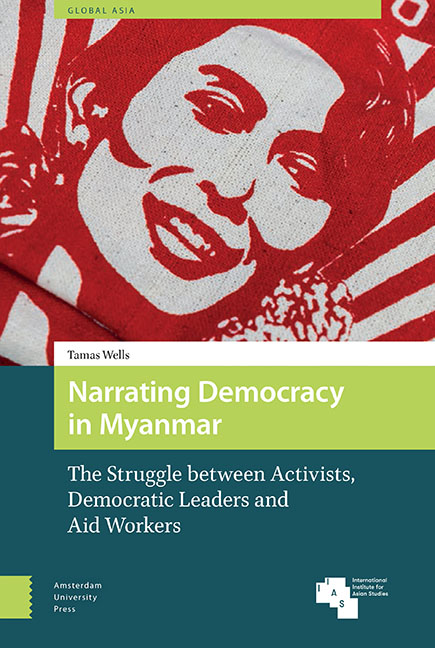Book contents
- Frontmatter
- Contents
- Abbreviations
- Acknowledgements
- Foreword
- 1 Introduction
- 2 Elucidating the Meaning of Democracy through Narrative
- 3 Toward the ‘Ocean of Democracy’?: The British Colonial Administration, the Thakin and Contests over Meanings of Democracy in late Colonial Burma
- 4 Burma after Independence: From Moral to ‘Disciplined’ Democracy
- 5 A liberal Narrative
- 6 A benevolence Narrative
- 7 An Equality Narrative
- 8 Exposing the Political use of Narratives
- 9 Beyond an ‘Ideal type’
- 10 Playing Different Games: Myanmar’s Future Challenges
- Index
3 - Toward the ‘Ocean of Democracy’?: The British Colonial Administration, the Thakin and Contests over Meanings of Democracy in late Colonial Burma
Published online by Cambridge University Press: 17 June 2021
- Frontmatter
- Contents
- Abbreviations
- Acknowledgements
- Foreword
- 1 Introduction
- 2 Elucidating the Meaning of Democracy through Narrative
- 3 Toward the ‘Ocean of Democracy’?: The British Colonial Administration, the Thakin and Contests over Meanings of Democracy in late Colonial Burma
- 4 Burma after Independence: From Moral to ‘Disciplined’ Democracy
- 5 A liberal Narrative
- 6 A benevolence Narrative
- 7 An Equality Narrative
- 8 Exposing the Political use of Narratives
- 9 Beyond an ‘Ideal type’
- 10 Playing Different Games: Myanmar’s Future Challenges
- Index
Summary
Abstract
To understand the dominant narratives described in this book, they need to be situated within the context of Myanmar's modern history and the ways different political actors – whether independence leaders, colonial administrators, military leaders or activists – have narrated that history. This is not an attempt to construct a unitary history of Myanmar, but rather to locate and uncover struggles over the meaning of democracy during these different periods and how they shape contemporary political uses of the word ‘democracy’ amongst the networks of activists and democratic leaders that I studied. The third chapter explores the example of contrasting meanings of democracy between British colonial administrators and the Thakin independence leaders in the late colonial period in Burma.
Keywords: Burma, British, colonial, Aung San, democracy, independence
In 1937, Chief Secretary to the colonial Government of Burma Frank Burton Leach published his work, The Future of Burma. According to Leach, there was a global current of politics which had ‘for the last century been carrying mankind towards the Ocean of Democracy’ (Leach 1937: 138). Leach considered the West to be the ‘centre of the stream’, while the East ‘has for the most part been left in backwaters along the banks’ (ibid.: 138). He concluded, however, that ‘the East has been gradually sucked into the main stream’ (ibid.). Late colonial Burma, with the support of the British, was moving toward the ‘Ocean of Democracy’.
Yet these were tumultuous times. There were waves of strikes and protests throughout Burma in 1938 and significant mobilisation of opposition to British rule. The Thakin movement was instrumental in this social mobilisation and in the years before the Second World War, ‘democratic freedom’ became a prominent goal for these independence activists (Aung San 1993a [1945]: 81). Yet, between colonial officials such as Leach and the Burmese Thakin, ‘democracy’ took deeply contrasting meanings. There was intense contest between British and Burmese elites in the late colonial period, not just over a transition to self-rule but over the meaning of democracy itself, and political rivals used contrasting narratives as tools to outflank their opponents.
- Type
- Chapter
- Information
- Narrating Democracy in MyanmarThe Struggle Between Activists, Democratic Leaders and Aid Workers, pp. 55 - 76Publisher: Amsterdam University PressPrint publication year: 2021



